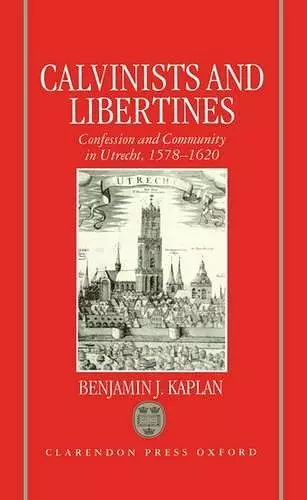Calvinists and Libertines
Confession and Community in Utrecht 1578-1620
Format:Hardback
Publisher:Oxford University Press
Published:12th Oct '95
Currently unavailable, and unfortunately no date known when it will be back

Winner of the 1996 Roland Bainton Prize - presented by Sixteenth Century Studies Conference for the best book on early modern history or theology. Winner of the Philip Schaff Prize, from the American Society for Church History
Why did the Netherlands, after the Dutch Reformation, emerge as the most religiously tolerant country in Europe? This study claims that the causes lie in the struggle between the Calvinist desire to create a highly organized, disciplined church, and the broad, nonconformist "libertine" alternative.After the Reformation, the Dutch Republic emerged as the most religiously tolerant country in seventeenth-century Europe. Benjamin Kaplan examines the reasons behind this phenomenon, focusing on the struggle of Calvinist reformers to realize their theocratic aspirations in the Netherlands, and the fierce opposition offered to them by a large, amorphous group of people known as `Libertines'. Nowhere was this struggle more intense than in Utrecht, a city at the heart of the Dutch Reformation. The author illuminates the nature of this conflict through a study of the city and people of Utrecht, examing social relations, popular piety, civic culture, and state formation. This urban case-study shows how Dutch religious developments fitted into the wider European framework. Offering a fascinating microcosm of religious tensions in Europe around 1600, Kaplan shows how the Calvinist-Libertine conflict in the Netherlands was in fact a local manifestation of a broader European phenomenon: the struggle between champions and opponents of `confessionalism'. He thus combines a new interpretation of the Dutch Reformation with a presentation that makes this largely unknown phenomenon accessible to students of other countries. As the first case-study in English of the Dutch Reformation, Calvinists and Libertines fills an important gap in our knowledge of Dutch history and in our understanding of the European Reformation as a whole.
The value of Kaplan's book consists in its combination of a detailed and thorough presentation of events, based on the study of a broad range of source material, with a structural analysis explaining and not merely describing the developments in Utrecht. It stands as an important contribution to the history of the Dutch Republic and to the debate over the usefulness of the notion of confessionalization in Europe in the late sixteenth and early seventeenth centuries. * Olaf Morke, Journal of Modern History *
Bernard Kaplan has produced an important work that deals with the process of confessionalization in Reformation and post-Reformation Utrecht. Kaplan has produced a fascinating account of the process of confessionalization in Utrecht, a city that has hitherto received little attention from Reformation historians. This work is admirably documented with archival sources and it is well written. The book is an excellent example of the recent trend in reformation history to combine elements of social, political and religious history into a coherent whole.
one of the most rewarding local studies to have appeared recently * Times Literary Supplement *
In my opinion, this book belongs to the 'top ten' st.s in Ref. hist. of cities. It is based on thorough investigation as well as on extensive knowledge of the field, and it produces its results with an unusual clearness. In the same time it also provokes a fudamental discussion concerning its starting points and on essential questions of detail. In short: an impressive contribution to Ref. hist. * Archive for Reformation History *
a magisterial treatment of the Remonstrant controversy in Utrecht ... It is hard to do justice to the breadth of insight which Kaplan displays in his superbly contextualised local study of the Reformation. It is a sterling contribution to the intellectual and social history of reformation Europe which should not be ignored by any scholar or student of the sixteenth and seventeenth centuries. What a pleasure to read a book which uses detail to draw out fresh interpretations of large questions, and which presents coherent conclusions, rather than simply obscuring or fragmenting an existing portrait of the past. * Scott Mandelbrote, Boekbeoordelingen *
this book has important ramifications not only for scholarship on the Dutch Reformation, but also for the study of confessional development in Reformation Europe ... perhaps the most important contribution of this very fine book is the precision with which Kaplan describes Dutch Libertinism ... Kaplan provides a persuasive account of how a distinct blend of civic culture and confessional identity came to coexist in Utrecht ... Scholars working in other Dutch cities will find his book a useful guide in sorting out this complex issue ... One can only hope that this nuanced and eloquent study of Utrecht will begin to insert the Netherlands into the scholarly discussion of confessionalism and society in Reformation Europe. * Charles H. Parker, St Louis University,Journal of Ecclesiastical History, Vol. 48 - No. 3, July 1997 *
this study is a valuable contribution to our understanding of religious developments in the formative years of the new Dutch state * J.L. Price, University of Hull, EHR Nov. 97 *
- Winner of Winner of the 1996 Roland Bainton Prize - presented by Sixteenth Century Studies Conference for the best book on early modern history or theology. Winner of the Philip Schaff Prize, from the American Society for Church History.
ISBN: 9780198202837
Dimensions: 224mm x 146mm x 25mm
Weight: 558g
362 pages